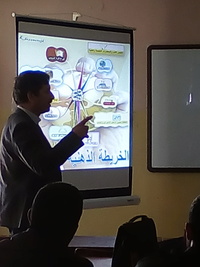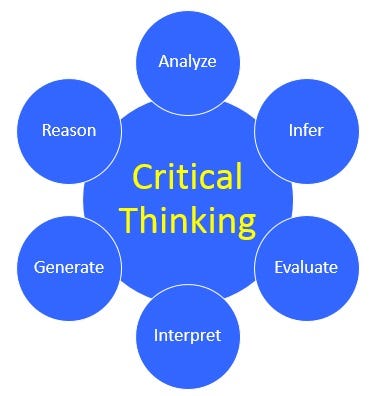freeman
المـديـر العـــام


عدد المساهمات : 19334
تاريخ التسجيل : 05/01/2011
العمر : 64
الموقع : http://sixhats.jimdo.com/
 |  موضوع: Why Kids Need To Develop Critical Thinking Skills موضوع: Why Kids Need To Develop Critical Thinking Skills  الإثنين مايو 18, 2020 5:30 pm الإثنين مايو 18, 2020 5:30 pm | |
| By Carol Miller On August 3, 2017 Play2Health
 In today’s technological and rapidly changing world, children need to be able to assimilate data and demonstrate critical thinking skills versus repeating a list of facts from memorization.
Children need to be thinking for themselves and asking the what now follow up question; these skills are what employers today and tomorrow are looking for. The ability to analyze a situation or problem is important skills that demand from employers will only grow as we continue to adopt technology throughout our lives.
Kids need to be critical thinkers who can make sense of information, analyze, compare, contrast, make inferences, and demonstrate higher order thinking skills.
As a parent, our role is to ask our children open-ended questions that guide the thinking process. This allows our kids to explore and expand their curiosity.
In other instances, it may be more appropriate to experiment with your child; this is easily done with science experiments, cooking lessons, arts and crafts and more. This allows our children to refine their theories on what why things happen; defining cause and effect.
Engaging with your child and facilitating the critical thinking process can have a positive an impact on them.
In other instances, it may be more applicable to encourage your child to experiment and refine their theories on cause and effect. To experiment and through experimenting develop the cause and effect of what happened.
Guiding your child’s critical thinking process can have a positive an impact on their problem-solving skills and leads to greater creativity and curiosity.
Critical thinking is a developed ability to analyze information to distinguish its veracity or truth.
In our rapidly evolving technologically driven world, more detail and information is available at our finger tips than we could ever need.
The issue is that not all of that information is correct and it can be effortless to get influenced into believing something that is not factual or real. This is one example of where critical thinking skills guide us.
How do you develop critical thinking skills in your children?
Here are some tips and ideas to help children build a foundation for critical thinking:
Provide ample opportunities for play
Pause and wait, let your child evaluate the situation, a parents role is to guide them
Do not intervene immediately
Ask open-ended questions
Help children develop hypotheses or the cause and effect
Encourage critical thinking in new and different ways
A few practical ways to introduce critical thinking activities to your kids:
Encourage pursuits of curiosity. As parents, we tend to dread “why” phase. However, we need to allow our children to form and test theories, experiment and understand how the world works. We need to inspire our kids to expand their curiosity, their creativity and explore, to ask questions, to test their ideas, think critically about results and reflect on alterations or adjustments that they can incorporate. Encourage them on things they could make or things they could do differently to instill critical thinking skills.
Learn from others. By instilling a love of learning, we help our children to think more deeply about things, to grow a desire to comprehend how things work. We need to teach children to look for the answers to their “why” questions using the internet, books, experiments, arts and crafts, building models, from friends, family and play activities.
Help children evaluate information. Thinks about this, how often we are given a lot of information at a time, and it is important we assess that information to determine if it is valid, necessary and whether or not we should believe it. We need to assist our children with learning these skills by showing them how to evaluate new information. We need to give them the opportunity to analyze where ideas and information originate, how it relates to what they already know and if it is or is not important.
Promote children’s interests. When children are deeply vested in a subject or pursuit, they are engaged and want to experiment. The process of expanding their knowledge base is an opportunities to develop critical thinking skills. As parents, we need to encourage this activity and facilitate our child’s interests. Be it learning how a 3d model can stand up to how a car engine works or a keen interest in bugs or in programming a simple game as parents we need to encourage our kids to follow their interest and passion.
Teach problem-solving skills. Everyone has problems or conflicts in their lives, and kids are no different. Critical thinking skills are essential to develop to understand the problem and develop possible solutions; we need to teach kids the steps of problem-solving to use with critical thinking to utilize as an effective problem-solving process.
Provide opportunities for play. Curiosity and experimenting on how things work are crucial to developing critical thinking. It is during play that children learn cause and effect. What happens if I mix water and baking soda? How do I build a water wheel and how does this create electricity? How does a mini dancer work? Can I add a block to balance on the top of a tower? By providing indoor and outdoor space for playing, along with time for the pretend play and development of critical thinking skills. These activities allow opportunities for open-ended questioning and for your child to experiment to see the reaction — cause and effect. Then move on to try something else and see if they can create a different result. Hands-on experiments and experiences are an integral foundation for abstract critical thinking that is required in life.
Pause and wait. Giving your child generous time to think, experiment with a task, or develop a response is critical, and not necessarily easy to do. As parents, we need to have patience and Tallow our kids the time to ponder and think, before we intervene or speak. This gives kids and opportunity to reflect on their response and refine, rather than answering with the first gut reaction.
Don’t intervene immediately. Observe what your child is doing before jumping in. As hard as it may be, avoid finishing or doing the task for them. For younger children, patiently adjusting and manipulate their hands to grasp a toy on their own encourages problem-solving, develops fine motor skills and develops executive functioning skills. For older children, ask open ended questions taught encourage critical thinking while providing enough information to prevent frustration, but not enough to solve the problem for them.
Ask open-ended questions. How many times has your child asked you a question that you could easily answer? Rather than answers the question, ask them a question in return to help them think critically: “Why do you believe that this happened? What is going on here?” “Who else would know the answer, why would their answer be that?” Even if the answer isn’t correct, respond with “that’s interesting,” and ask “why do you think that is?” “I am interested to hear why you believe that this happens…” “What would you do to solve this problem?” “How can we find more information to address or answer this?”
Help children develop hypotheses. Taking a moment to form hypotheses during play is a critical thinking exercise that helps develop skills. Try asking your child, “What will happen if we do this?” or “Let’s try it and see what will happen next.”
Encourage thinking in new and different ways. Allowing kids to think differently, enables their creative problem-solving skills. Ask questions like, “What other ways can we try?” Encourage your child to develop options by saying, “Let’s think of all the possible ways we could do this.” If as a parent you need to step in, talk through the why of your decision and demonstrate your critical thinking and problem-solving. This allows kids the opportunity to model your behavior. Allowing your children to navigate problems allows them to analysis and develop critical thinking skills that will aid them in the long run.
Is Teaching Critical Thinking Skills Important? August 3rd, 2017 Carol Miller
ْ
________*التــَّـوْقـْـيـعُ*_________
لا أحد يظن أن العظماء تعساء إلا العظماء أنفسهم. إدوارد ينج: شاعر إنجليزي
| |
|
